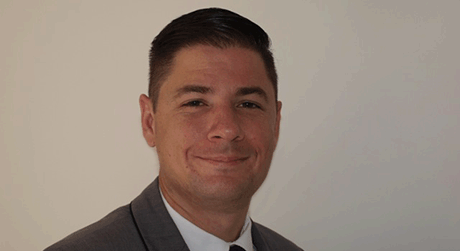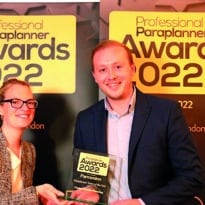Martin Green has two paraplanning awards under his belt and says he intends to use them to help promote paraplanning around the industry. “I wouldn’t want to put the award on the shelf and leave it there – I believe if you’ve been given that kind of accolade then you should use it to represent what you do and I want to help drive the profession forward,” he says.
Winner of the Platforum Best Paraplanner award in 2014 and Paraplanner of the Year at the 2015 Money Marketing awards, Martin (pictured) started in the industry in 2001 as a pensions analyst with Wentworth Rose (later acquired by Origen) and joined his current firm Chadney Bulgin in 2006 as the firm’s first fully-fledged paraplanner. He was promoted to paraplanning manager for the firm in 2011 and now leads a team of eight paraplanners in the wealth management side of the business.
Since winning the Platforum award Martin says his Twitter account followers have grown massively, “given I hadn’t really used the account since setting it up three years ago” but, more importantly, he has become actively involved as a paraplanner in the Personal Finance Society (PFS). Now he sits on the PFS Paraplanning Practitioner Panel and has been involved in setting up the PFS ‘Purely Paraplanning’ conferences, which will run in September in Leeds, Bristol and London. He will also be on stage at the conferences, taking part in the panel debate on sharing best practice. With paraplanners forming the second largest contingent of PFS members, Martin says the Society wanted to recognise that part of its membership and to see how the society could better help paraplanners in their roles. Hence it looked to appoint a paraplanner to the PFS Board – Cathi Harrison, MD of Para-Sols, took up a board position in September 2014 – and set up the Paraplanning Practitioner Panel.
A key aim of the Panel is to help attract more young people into the industry, which chimes with the Society’s promotion of financial services apprenticeships and presenting at Universities to raise the profile of financial advice as a career opportunity among graduates, Martin says. “It’s been baby steps for the Panel to start with but now, with the rollout of the conferences, we are getting somewhere fast,” he adds. Personally, he says, he would like to see a “breaking down of barriers” in the industry, “a greater sharing of ideas and getting companies to make the material they offer more relevant to us as paraplanners rather then rebadging what they’ve produced for advisers”. “And I believe we need to define and refine the role of paraplanning, and get people enthralled about paraplanning as a career, rather than seeing it as a stepping stone to being a financial adviser.”
His view that the paraplanner role needs to be more defined, he says, comes off his concern that with the current high demand for paraplanning and as the profession grows, the temptation will be for people to see paraplanning as a way to generate extra income and that could lead to problems. “The range of roles that come under the term paraplanner is also quite widely spread – from people who just write reports to people qualified and experienced enough to question and challenge advisers; they are all called paraplanners. What I’m concerned about is that we will see standards diluted by people saying they are paraplanners but who don’t really have the qualifications or the experience to do a proper job. That could affect the reputation of the profession.”
CF30
Currently Martin is qualified to Diploma level and working his way toward Chartered status. He became CF30 authorised in 2011, to coincide with his appointment as paraplanning manager at Chadney Bulgin but also to enable him to become more active in client meetings. “When I attend client meetings, the financial planner will take the client relationship role and look to me for the technical information, or if we need to drill down a bit more into the nitty-gritty of the plan. I was authorised so I could talk to the client about the underlying products and the reasons behind why they were chosen,” he says. His firm has been “massively supportive” he says both in bringing him on as a manager and in its help with gaining qualifications. “When I was appointed as a manager, I was faced with a steep learning curve. The firm paid for me to go on a management course, and my boss, David Thomas (joint managing partner at the firm) took me under his wing and taught me the ropes on how to manage people”. “And knowing how difficult it is to juggle work and exam revision, for a couple of months prior to our exams, he has provided discussion sessions before work for me and colleagues, to go through the CII books and past exam papers.”
Team work
The firm has nine paraplanners including Martin serving 19 wealth management advisers and another three paraplanners working in a separate mortgage department. Martin says he would rather recruit people with drive and passion for what they want to do in life than highly trained and qualified people who don’t have the enthusiasm for the job. “A passion for things is innate in people. I’ve trained up good administration staff within the company to be paraplanners because you can teach people the technical side but you can’t teach them enthusiasm. You can have really intelligent, knowledgeable people who just don’t have the attitude or the skills to do the other side of the job.” And when you have a good team, Martin says, you can call on their collective expertise for tasks like due diligence.
Martin sits on the Chadney Bulgin investment committee, which selects the products the firm will use. In researching the products Martin says, members of the paraplanning team will each take a product, analyse it and report back at a mini-paraplanning meeting. “Everyone goes through their allocated product, asks questions and the meeting is written up. Then we come up with the solutions we want to use. Then I present the results back to the committee,” Martin says. “I find carrying out due diligence this way the team is more tightly knitted; each member knows all about the products when they come up in financial plans, and where appropriate, they can suggest new products to the advisers that the advisers may not know about, because the team has been through this process.”
For more details on the PFS Paraplanner Conferences CLICK HERE





























